Subscriber Benefit
As a subscriber you can listen to articles at work, in the car, or while you work out. Subscribe Now1. Mainstreet
 Mainstreet CEO Zeke Turner builds nursing homes, and plans to begin operating them, too. (IBJ file photo)
Mainstreet CEO Zeke Turner builds nursing homes, and plans to begin operating them, too. (IBJ file photo)Mainstreet CEO Paul “Zeke” Turner has seen the future of health care, and he’s decided to pounce. The company, which started as a health care real estate investment company that built senior living facilities (its real estate investment trust called HealthLease is traded on the Toronto Stock Exchange), has branched out to build short-term rehabilitation centers called “recovery suites.”
Mainstreet has built 14 of these facilities—usually near hospitals—and has 17 more under construction or in planning stages. That, Turner said, helped drive the company from $11 million in revenue in 2011 to more than $66 million two years later, a nearly fivefold increase.
“It’s a brand new health care product that virtually doesn’t exist nationwide, and we are at the forefront,” he said. “All of the health care change that’s going on right now is moving people out of hospitals to a lower-cost setting. But it still has to be quality, and right now there’s not a lot of quality out there that’s post-hospital stay.
“So we’re in the right place at the right time. We’ve invested heavily into our systems and our designs and now are really bearing the fruits of a lot of years of labor.”
That’s just a next step for Mainstreet, Turner said. In the middle of 2013, he began to feel like there was a dearth of good operating companies that understood the changes coming to health care and embraced what this would look like for the next generation.
So beginning in 2015, rather than only build facilities that others operate, Mainstreet will begin to operate some facilities that it builds. The first two are scheduled to open in Carmel and Bloomington.
“I feel like we’re in the very early stage of our growth opportunities,” Turner said. “It’s been good from a financial standpoint, but given the opportunity nationwide, we really feel like there are opportunities to grow at a really nice pace.”
2. TrendyMinds
The advertising/marketing/public relations firm TrendyMinds traces its growth to 2010, when the White House reached out to the National Gay and Lesbian Chamber of Commerce to ask for a member that was doing well. The chamber cited TrendyMinds, and President/CEO Trevor Yager was invited to the State of the Union address.
“A lot of companies hadn’t heard of us at that point, and we started to get a lot of inquiries,” Yager said.
Accounts with Eli Lilly and Co., Indiana University Health, ExactTarget Inc. and Harrison College followed.
Yager said “getting known, picking up some great clients and doing good work” led to TrendyMinds’ 181-percent growth over three years—from about $1.7 million to more than $4.7 million.
“The clients trust us to flex our creativity and push the envelope on things,” he said.
The growth has continued. At the end of 2013, TrendyMinds purchased a smaller agency called Tactic LLC, and bought a building at the corner of Park and Market streets, two doors down from its headquarters in the former Carpenters Union building. Half of the building houses Tactic; the other half is the new video division, Think Ahead Studios.
Tactic—which has a client base that includes the Morales Group, Shiel Sexton and Conner Insurance—will continue its focus on the small-to-medium business market, while TrendyMinds will concentrate more on larger enterprises, Yager said.
“We were getting to the point where we were looking at turning away business, and we didn’t want to do that,” he said. “So this was a great way for us to be able to have leads and move people in. It also gives our team flexibility, so as people want to grow and do different things, they can work in one division and go to another if they want to.”
3. enVista LLC
Contracts with 650 companies including such major names as Walmart.com, HHGregg Inc., sporting goods retailer Hibbert Sports and beauty retailer Sephora have helped enVista grow an average of 44 percent every year the last 12 years, said President and CEO Jim Barnes.
The IT consulting organization creates strategies to help companies move goods through supply chains efficiently. Ongoing investment in strategic software that enVista builds will enable the company to continue to grow, Barnes said.
But he said its growth can truly be traced to its business philosophy: Because enVista is “a company without a product,” it needs to hire the best and brightest people who are self-motivated. “Basic blocking and tackling,” he called it.
“We treat our people with respect, they trust the leadership team, they understand our intent and where we’re going as an organization,” Barnes said. “There’s never any doubt about where we’re at and where we’re going.
“We’re also transparent with our financials, so everyone knows when we’re doing well and when we’re doing bad,” he added. “When we’re doing bad, we all suffer together, and when we’re doing well, we all celebrate in the success.”
Barnes said enVista is on target for 36-percent growth in 2014. In fact, the company is actually trying to slow down a bit.
“To keep our foot on the accelerator, we’ve got to look inward and do some things to make sure our talent is trained better and we’re producing quality solutions for our clients,” he said.
That said, Barnes added this: “But it’s hard to get off the wave when we’re on a tidal wave. Right now, we’re on a tidal wave, and we’re getting pulled along with it. We’re in a good place.”
4. Element Three Inc.
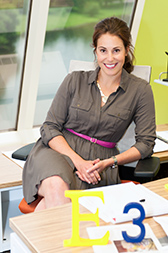 Element Three’s Tiffany Sauder credits the firms’ growth to clients’ willingness to spend heavily. (IBJ photo/Eric Learned)
Element Three’s Tiffany Sauder credits the firms’ growth to clients’ willingness to spend heavily. (IBJ photo/Eric Learned)Element Three clients are spending three times as much as they used to with the branding/marketing firm. That accounts for the company’s growth, President Tiffany Sauder said.
“That’s a key indicator that what we’re doing is successful,” she said. “People are seeing it makes sense to spend more money on us. We can get a lot bigger with fewer clients, which is a much healthier way for a company to grow.”
What’s driving them to spend more, she said, is the real story of why Element Three is growing.
Sauder said Element Three was “a run-of-the-mill advertising agency” until a couple of years ago. That’s when the company approach changed—instead of pushing out messages to consumers, it would create content so that when a consumer went searching for information, Element Three’s clients would be prepared to help.
As an example, she cited client Newmar, a high-end luxury recreational vehicle manufacturer in Nappanee. Previously, a customer who wanted an RV would drive onto a dealership lot and would ask the salesperson what they had. Now, the buyer goes online and studies floor plans, finishes and gas mileage, while checking out reviews.
Element Three makes sure all that information is easily available to the customer.
“We turn our clients’ brands into magnets,” Sauder said, “so that when people want what you have, you are found.”
The new approach continues to work well. Element Three is ahead of plans by 30 percent this year, Sauder said, and the company is taking over a second floor of its building in the Pyramids on the northwest side.
“When we started being very honest with ourselves about that, that’s what we are great at, our work started to get better and better, our clients got bigger and bigger, the retention was better and better,” she said. “So it all built on itself.”
5. BidPal Inc.
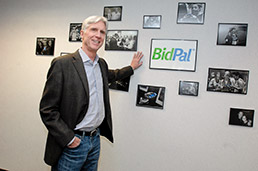 BidPal CEO Scott Webber is building growth by helping not-for-profits hold silent auctions online. (IBJ file photo)
BidPal CEO Scott Webber is building growth by helping not-for-profits hold silent auctions online. (IBJ file photo)There are more than 1.5 million 501(c)(3) organizations in the United States, and an overwhelming majority of them need to raise money. More and more, BidPal CEO and Chairman Scott Webber says, those not-for-profits are turning to his company, and that is what’s driving its revenue growth—from nearly $5.2 million in fiscal 2011 to $13 million in 2013.
“We created a paradigm shift, a new way for these organizations to have bidding on their silent auctions and do charitable appeals during those events,” he said. “We created a whole new market. It’s a huge market.”
Webber also credits BidPal’s growth to its suite of software that helps organizations fund-raise not just for special events, but every day. Using BidPal’s technology, organizations can sell tickets, register for auctions, and make donations while automating the credit card processing. The result is a “painless process that helps them make more money,” he said.
Webber said BidPal’s reputation spreads by word of mouth—“From every event we do, we get five to 10 new leads.” Online marketing, direct sales and telemarketing also bring in new customers. It’s helped, he said, that half of BidPal’s employees have worked for charitable organizations, which makes them committed to helping these organizations raise more money.
“Instead of helping one organization be more successful,” Webber said, “they’re helping thousands of organizations be more successful.”
Webber said BidPal’s future looks bright.
“We are clearly the dominant player in the market,” he said, “and that allows us to have continually a better fleet of products, an integrated suite of products, and a growing suite of products as we continue to invest in adding more and more tools for these organizations to be able to raise money more effectively.”
6. FitzMark Inc.
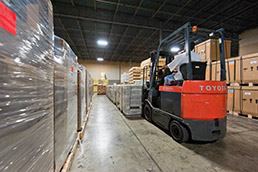 FitzMark grew its distribution business with big accounts, but now wants to focus on local and regional clients. (IBJ photo/Eric Learned)
FitzMark grew its distribution business with big accounts, but now wants to focus on local and regional clients. (IBJ photo/Eric Learned)Trucking/warehouse firm FitzMark has made its mark across the country with distribution centers in Atlanta, Chicago, Dallas, Denver, Los Angeles, Orlando and Seattle. Now President Scott Fitzgerald wants to grow the company in its home base of Indianapolis.
So this summer, FitzMark plans to hire 20 people, primarily adding to its sales force, to go out and saturate the local market.
“We have some nice national accounts, but we need to focus on local and regional customers,” said Fitzgerald, who started his career with a national trucking company in Indianapolis before going out on his own. “We’ve been around for seven to eight years and I don’t think we’ve ever been mentioned in the IBJ. But obviously we’ve done something right for a couple of years.”
FitzMark actually has been mentioned in this paper before—in June 2012, when it announced plans to hire 30 employees by the end of the year to fill customer service and purchasing positions. At the time, the company attributed much of its growth to its FreightCity Inc. subsidiary. The online business directly connects shippers and carriers, and allows electronic shipment bidding.
These days, Fitzgerald attributes the company’s growth to “just hiring the right people and sticking to what we do.”
“Our customer base is very diverse, so it covers a lot of industries,” he said, citing clients Pepsi and Whole Foods, as well as Indianapolis-based Harris & Ford chemical distributors. “Nothing significant has happened in a specific industry to push the growth.”
But FitzMark has branched out into the keg-supply business—providing lease-to-own kegs for the extra-expanding world of microbreweries. It’s picked up customers that way, Fitzgerald said, including Daredevil Brewing Co. in Shelbyville and New Day Meadery in Fountain Square.
“They all need kegs,” he said, “and kegs aren’t cheap.”
7. Sun King Brewing Co. LLC
 Sun King markets heavily through such not-for-profits as Indiana Landmarks and Indianapolis Symphony Orchestra. (IBJ file photo)
Sun King markets heavily through such not-for-profits as Indiana Landmarks and Indianapolis Symphony Orchestra. (IBJ file photo)Clay Robinson was standing in the Sun King warehouse, watching the results of another expansion that includes a new packaging area. The business plan he and partner Dave Colt wrote five years ago called for them to be brewing 5,000 barrels of beer a year by this point. This year, Sun King is poised to make 29,000 barrels.
More beer has meant more hiring—Sun King now has a full-time human resources manager, 48 full-time employees and more than 60 part-timers—and more profits have enabled the company to add a 401(k) with company match and employee health care coverage.
Revenue last year surged to $7.4 million from $3.3 million in 2011, a 123-percent increase.
“It is bigger, more intense and greater than anything we had ever imagined,” Robinson said. “We’ve turned that corner from startup company to stable, active organization with a level of maturity. Everything’s really come together for us.”
Robinson said Sun King’s success comes in part from aggressive marketing.
The company does around 200 events a year in conjunction with various not-for-profits, including Indiana Landmarks, the Humane Society of Indianapolis, the Indianapolis Museum of Art and the Indianapolis Symphony Orchestra.
“We’ve tried to embed ourselves in everything that is community and culture in central Indiana,” Robinson said. “We’ve got beer, and if we can help organizations sell beer to help support their endeavors, then everybody wins.”
Sun King also seems to have inspired others. Robinson said that in 2009, Sun King received the 32nd brewery license in Indiana. There are 82 breweries operating now.
Five years ago, Robinson said, about two or three of every 100 beers consumed in Indiana came from a craft brewery. Now that number is approaching six per 100.
“There’s been a huge shift in the beer-drinking populace in our area over the last five years,” he said. “That’s been good for my company—and good for all of these startups.”
8. Stratosphere Quality LLC
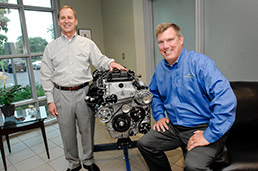 Steve Cage and Tom Gray, Stratosphere owner and chief operating officer, are doing well because carmakers are doing well. (IBJ file photo)
Steve Cage and Tom Gray, Stratosphere owner and chief operating officer, are doing well because carmakers are doing well. (IBJ file photo)These are good times for auto manufacturers—and that means good times for Stratosphere Quality, which devotes 90 percent of its business to inspecting auto parts to make sure they meet quality standards.
Chief Operating Officer Tom Gray said his company has grown from $38 million to more than $80 million in revenue in the past three years—a 111-percent increase, ranking it eighth—largely due to expansion in the auto industry.
“Every time there is a model refresh or a new model launched, that’s certainly good for our business as the manufacturers are focused on ensuring that the final quality of that vehicle is up to their expectations,” he said.
Stratosphere Quality now does business in about 20 states and Ontario, Canada. Gray said the company is looking outside the United States and Canada, and expects to establish a presence elsewhere by the end of the year.
Stratosphere also has been diversifying its business—adding appliances, power equipment and medical devices. Last year, the company opened a second corporate building in Fishers that includes space for office personnel as well as a warehouse devoted to medical-device work.
“As soon as we got that building in place, we saw—as we had hoped to—an increase in that particular piece of our business,” he said.
Overall in 2013, Gray said, Stratosphere employees sorted 211 million parts and found more than 6 million that were nonconforming or bad.
“It’s always nice,” he said, “when you get tangible proof of the hard work and the value you bring to your customers when you can point to something like this and say, ‘See, we’re making a difference.’ It’s a niche industry, but for the providers who can deliver what they say they can, there is great success to be had.”
9. Encore Sotheby’s International Realty
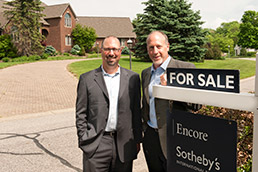 Encore Sotheby’s Mark Zukerman and Brent Claymon doubled their sales on an improving economy and marketing prowess. (IBJ photo/Eric Learned)
Encore Sotheby’s Mark Zukerman and Brent Claymon doubled their sales on an improving economy and marketing prowess. (IBJ photo/Eric Learned)For the first two years after they franchised the Sotheby’s name, which is synonymous with high-end auctions, Mark Zukerman, Brent Claymon and their agents devoted a lot of time to educating the Indianapolis market about who they were and what they did.
Those efforts paid off, as sales volume climbed from $47 million in their first year, 2009, to $160 million last year.
That’s not just high-end properties, Zukerman said. In 2013, 36 percent of the properties Encore Sotheby’s sold in Indianapolis were homes priced at $300,000 or less. About 13 percent were $1 million or more, he said. Still, their average sale price in 2013 was $317,334—roughly double the Metropolitan Indianapolis Board of Realtors average of $159,434.
Zukerman credits his agency’s rapid growth to the level of marketing materials, the power of the brand and the quality of their personnel.
“It’s a pretty powerful cocktail,” said Zukerman, who was a developer before he got into the brokerage business. (Among his developments was Laurel Ridge at 106th Street and Ditch Road in Carmel.)
He said a couple of other factors have spurred growth, too: The marketplace has improved and consumer confidence “seems to be coming back in the right direction.” There’s also more activity in higher-priced homes.
“Prices may not have recovered yet in some of those price points,” he said, “but there’s activity in those price points.”
That should continue to improve this year, Zukerman said. He projects $200 million in sales for Encore Sotheby’s in 2014.
“I think the high end will continue to recover,” he said. “Prices will slowly recover. I’m glad it’s a gradual recovery. I think if we made a snap-back recovery, I’m not sure we could maintain. But with the pace of how things are improving, the long term is looking good today.”
10. SmartIT Inc.
What used to be called SmartIT Staffing Inc. is now SmartIT Inc.—a name Chief Operating Officer Paul Rothwell said reflects the company’s expansion. Instead of just staffing, now the company does more consulting, technology solutions and industry solutions work.
“Staffing is the underpinning of all IT services and all IT projects,” he said. “We’ve got that piece down really well. Now we’ve added additional value for clients so it’s not just staffing—it’s IT services and additional projects. Clients have liked us on the staffing side, and they’ve asked for more. And I think we’ve tried to give them more.”
SmartIT finds both temporary and permanent personnel for its clients, which typically are Fortune 5,000 companies that might need full-time help or just people to handle a specific project. He declined to disclose names, but described some: a large Indianapolis-based pharmaceutical company; a large Indianapolis-based student-loan-processing company; a large Indianapolis-based health insurance company.
For smaller clients, it can be difficult to attract and retain IT personnel, so “it’s easier for us to hire that person and deploy them to a client site,” he said.
“You see in the papers today how everyone says they can’t find enough IT people,” Rothwell said. “There’s not enough good people out there. Clients that we have face those challenges. It’s hard for us to find good people—and that’s our core business. So it’s really hard for them to find good people.”
SmartIT, which incorporated in Indianapolis in 2005, did business in more than 25 states last year, Rothwell said. The company, which projects $50 million in revenue this year, has an office in Cincinnati and earlier this year added one in Columbus, Ohio.
“This is a result of relationships we’ve done that clients have just multiple locations and they take us along,” Rothwell said.•
Please enable JavaScript to view this content.
